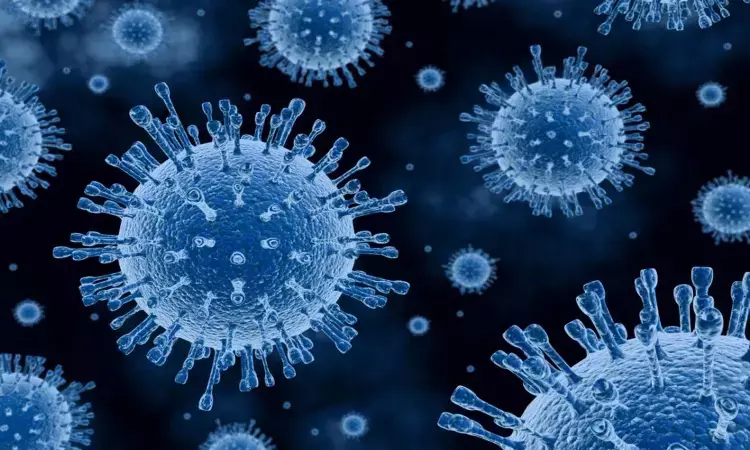- Home
- Medical news & Guidelines
- Anesthesiology
- Cardiology and CTVS
- Critical Care
- Dentistry
- Dermatology
- Diabetes and Endocrinology
- ENT
- Gastroenterology
- Medicine
- Nephrology
- Neurology
- Obstretics-Gynaecology
- Oncology
- Ophthalmology
- Orthopaedics
- Pediatrics-Neonatology
- Psychiatry
- Pulmonology
- Radiology
- Surgery
- Urology
- Laboratory Medicine
- Diet
- Nursing
- Paramedical
- Physiotherapy
- Health news
- Fact Check
- Bone Health Fact Check
- Brain Health Fact Check
- Cancer Related Fact Check
- Child Care Fact Check
- Dental and oral health fact check
- Diabetes and metabolic health fact check
- Diet and Nutrition Fact Check
- Eye and ENT Care Fact Check
- Fitness fact check
- Gut health fact check
- Heart health fact check
- Kidney health fact check
- Medical education fact check
- Men's health fact check
- Respiratory fact check
- Skin and hair care fact check
- Vaccine and Immunization fact check
- Women's health fact check
- AYUSH
- State News
- Andaman and Nicobar Islands
- Andhra Pradesh
- Arunachal Pradesh
- Assam
- Bihar
- Chandigarh
- Chattisgarh
- Dadra and Nagar Haveli
- Daman and Diu
- Delhi
- Goa
- Gujarat
- Haryana
- Himachal Pradesh
- Jammu & Kashmir
- Jharkhand
- Karnataka
- Kerala
- Ladakh
- Lakshadweep
- Madhya Pradesh
- Maharashtra
- Manipur
- Meghalaya
- Mizoram
- Nagaland
- Odisha
- Puducherry
- Punjab
- Rajasthan
- Sikkim
- Tamil Nadu
- Telangana
- Tripura
- Uttar Pradesh
- Uttrakhand
- West Bengal
- Medical Education
- Industry
IDSA issues statement on prioritizing COVID-19 Testing

The Infectious Diseases Society of America has developed recommendations for public health and health care professionals to prioritize testing for COVID-19 during the shortage of accessible tests and the continuing spread of the virus. They have erecommend a four-tiered approach, based on the following indications:
Among those given top priority are ICU patients with unexplained viral pneumonia or respiratory failure, as well as anyone with fever or symptoms of lower respiratory tract illness who has had close contact with a confirmed COVID-19 case or has traveled to an area with sustained community transmission within 14 days of symptom onset.
Tier one: Critically ill patients with unexplained symptoms; individuals with respiratory symptoms and contact with positive COVID-19 patient or recent travel to areas with high community transmission; patients with fever or respiratory infections who also are immunocompromised (including those with HIV), elderly or have underlying chronic conditions; and individuals critical to the pandemic response who experience respiratory symptoms, such as health care workers, public health officials and other essential leaders.
Tier two: Non-ICU hospital patients and long-term care residents with symptoms.
Tier three: Patients in outpatient settings who meet the criteria for influenza testing, including those with select co-morbid conditions like diabetes, COPD, congestive heart failure; pregnant women; and symptomatic children with additional risk factors.
Tier four: Individuals in communities being monitored by health authorities, to collect data and ascertain the prevalence of COVID-19.
Overall, the current prevalence of COVID-19 disease in the United States, as quantified by positive test results, remains low. Given the paucity of available tests, however, it is likely that the number of infected individuals is greater than reported. IDSA is asking for new policies and investments to improve access to testing for this and future pandemics. IDSA encourages everyone to adhere to federal and public health guidance. View the full recommendations and learn more at the IDSA COVID-19 Resource Center. We will revise the recommendations as data and information become available.
Hina Zahid Joined Medical Dialogue in 2017 with a passion to work as a Reporter. She coordinates with various national and international journals and association and covers all the stories related to Medical guidelines, Medical Journals, rare medical surgeries as well as all the updates in the medical field. Email: editorial@medicaldialogues.in. Contact no. 011-43720751
Dr Kamal Kant Kohli-MBBS, DTCD- a chest specialist with more than 30 years of practice and a flair for writing clinical articles, Dr Kamal Kant Kohli joined Medical Dialogues as a Chief Editor of Medical News. Besides writing articles, as an editor, he proofreads and verifies all the medical content published on Medical Dialogues including those coming from journals, studies,medical conferences,guidelines etc. Email: drkohli@medicaldialogues.in. Contact no. 011-43720751


